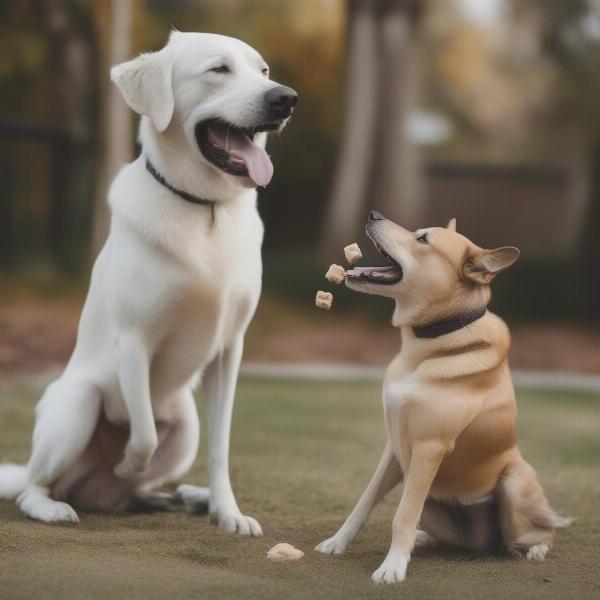Training an older dog can sometimes feel like an uphill battle, but it’s absolutely achievable and rewarding. Contrary to the old saying, you can teach an old dog new tricks! With patience, consistency, and a positive approach, you can help your senior canine companion learn new behaviors, strengthen your bond, and improve their quality of life. This guide will provide you with practical tips and techniques to successfully train an older dog, regardless of their previous experience or background.
Understanding Your Older Dog’s Needs
Senior dogs have unique needs and learning styles. They may have physical limitations, such as arthritis or vision impairment, that require adjustments to traditional training methods. Understanding these limitations is crucial for effective training. Additionally, older dogs may have pre-existing learned behaviors that need to be modified. Patience and understanding are key. Remember to keep training sessions short and frequent to avoid overwhelming your dog.
Physical Considerations
Older dogs may tire more easily, so shorter training sessions are recommended. Adjust your expectations and be mindful of any physical limitations. For example, if your dog has arthritis, avoid exercises that put excessive strain on their joints. Instead, focus on mental stimulation and gentle exercises.
Cognitive Changes
Some older dogs may experience cognitive decline, similar to dementia in humans. This can affect their learning ability and memory. If your dog exhibits signs of cognitive decline, consult with your veterinarian. They can offer advice on how to adapt training methods and manage your dog’s condition.
Positive Reinforcement is Key
Positive reinforcement methods, such as rewarding desired behaviors with treats, praise, or toys, are the most effective for training older dogs. Avoid punishment, as it can create fear and anxiety, hindering the learning process. Focus on building a positive association with training.
Choosing the Right Rewards
Identify what motivates your dog. It could be a favorite treat, a special toy, or simply verbal praise and affection. Use high-value rewards for more challenging tasks. Keep training sessions fun and engaging.
Consistency and Patience
Consistency is crucial. Use the same commands and cues consistently. Be patient and understanding. Progress may be slower than with a puppy, but with consistent effort, you’ll see positive results. Celebrate small victories and focus on building a positive learning experience for your dog.
 Positive reinforcement dog training
Positive reinforcement dog training
Addressing Common Challenges
Older dogs may have developed undesirable habits over time. Addressing these requires patience and a consistent approach. Focus on replacing unwanted behaviors with desired ones.
House-Soiling Accidents
House-soiling accidents can become more frequent in older dogs due to medical conditions or cognitive decline. Consult with your vet to rule out any underlying medical issues. Establish a regular potty break schedule and reward successful potty breaks. why does my dog keep peeing on my couch
Increased Anxiety
Older dogs may experience increased anxiety due to changes in their environment or routine. Create a safe and comfortable space for your dog. Use calming techniques, such as gentle massage or aromatherapy, to help reduce anxiety levels. urinary supplements for dogs
Difficulty Learning New Commands
Break down complex commands into smaller, manageable steps. Reward each successful step. Gradually increase the difficulty as your dog progresses. Remember to keep training sessions short and engaging to maintain your dog’s focus.
Conclusion
Training an older dog is a rewarding experience that strengthens the bond between you and your furry friend. While it may require some adjustments to traditional training methods, with patience, consistency, and a positive approach, you can teach your older dog new tricks and improve their quality of life. Remember to consult with your veterinarian for guidance on addressing any age-related health concerns that may impact training.
FAQ
- Is it too late to train my senior dog? No, it’s never too late to train a dog, regardless of their age.
- How long should training sessions be for an older dog? Keep training sessions short and frequent, typically 5-10 minutes at a time.
- What are the best training methods for senior dogs? Positive reinforcement methods using rewards and praise are most effective.
- What should I do if my older dog is having accidents in the house? Consult with your veterinarian to rule out medical issues and establish a regular potty break schedule.
- How can I help my older dog with anxiety? Create a safe space, use calming techniques, and consult with your vet for further guidance.
- What if my older dog is having trouble learning new commands? Break down commands into smaller steps and reward each successful attempt.
- Can I teach an older dog tricks? Yes! Older dogs can learn new tricks with patience and positive reinforcement. dog treat holder
ILM Dog is a leading international pet website dedicated to providing expert advice and resources on all aspects of dog care, from breed selection and health to training and nutrition. We offer practical, reliable information to help dog owners worldwide provide the best possible care for their canine companions. dogs on roads Our expertise in dog training and behavior can help you navigate the challenges of training an older dog. dog bandanas tartan For personalized advice and support, contact us at [email protected] or +44 20-3965-8624. ILM Dog is committed to helping you and your furry friend live a happy, healthy life together.